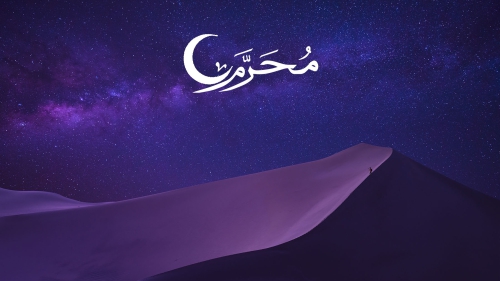Shared and Unique Aspects of Islam and Judaism

In an article on his website My Islaam, Mufti Sufyan Ibn Yakub Khapi writes: “One of my esteemed teachers once stated that the closest religion to Islam in this day and age is Judaism. This statement has been at the back of my mind for a long time, probing me to research its accuracy.”
The highly regarded Mufti concludes his article by stating that “Islam is akin to Judaism in its essential religious outlook, jurisprudence, structure and practice.
“There has been a significant and continuous, theological, physical and political overlap between the two religions in the past fourteen hundred years. This is because of the similarities between both faiths, along with the influence of Muslim culture and philosophy on practitioners of Judaism within the Islamic world.”
Mufti Sufyan Ibn Yakub Khapi begins his article by stating: “Islam and Judaism are two religions that share similar values; hence there is a special relationship between them. Furthermore, Islam includes Jewish history as part of its own. This is clear from the fact that the Children of Israel are regarded as a central religious concept in Islam. That is why there are many references to Israelites in the Qur’ān and Prophetic narrations. Moreover, Moses عليه السلام, the Prophet specifically sent to the Israelites has been mentioned in the Qur’ān more than any other prophet. In Judaism, Muslims are seen as righteous people of God. This is because Jews perceive Muslims as monotheists.
“Islamic sources suggest that in Prophet Muhammad ﷺ’s time a Jewish community was living in Medina and not Muhammad ﷺ’s birth town of Makkah. Muhammad ﷺ’s own tribe forced him out of Makkah and he subsequently sought refuge in Medina. This is when Prophet Muhammad ﷺ came into contact with the Jewish community. From this point onwards, Islamic images of Jews were first established.
“The Qur’ān first instructed Prophet Muhammad ﷺ to visit the Jews and learn from them: “And if you (Muhammad) are uncertain about what We have sent down to you, ask those who read the Book [that was] before you. The truth has come to you from your Lord, so never be one of those who doubt” (Qur’ān, 10:94). “At the same time the Qur’ān condemns Jews due to their rejecting the prophetic status of Muhammad ﷺ”
Why did most Jews in Medina not support Prophet Muhammad’s claim to be an authentic prophet of the One God? The first reason was that almost all of Medina’s Jews were afraid that after the death of Prophet Muhammad, his ex-Pagan polytheist followers would turn him into a son of God and worship him; just as the followers of Prophet Jesus turned Jesus into a Son of God; and not only worshiped Jesus but influenced millions of other people to worship Jesus,
and then started to forcefully persecute all Jews who refused to worship Jesus. Thank God that never happened; but the fear that it would happen was realistic.
The second reason was Arab tribal politics. The three major Jewish tribes were each allied with one of the various always contending Pagan Arab tribes in Medina. Medina’s Jews consisted of two groups: Arab Jews and Jewish Arabs.
The Arab Jews were Arabic speaking descendants of Jews who had immigrated south from Judea following two disastrous rebellions against Roman rule in 66-70 CE and 132-135 CE. In each war tens of thousands of Jews were killed; and much larger numbers were forced to flee their homes in the Land of Judea. Many of these Jews fled south along the coast of the Red Sea, settling in the oasis of Khaybar, 93 miles north of Medina, or in Medina itself, and as far south as the Yemen.
Jews avoided settling in Makkah, because the Pagan Arabs of Makkah had over many centuries filled the Ka’ba sanctuary, once re-built by Abraham and his son Ishmael, with 360 statues and pictures of the many Gods worshipped by the dozens of Pagan Arab tribes throughout Arabia. The Judean Jews who settled in Medina formed the three main Jewish tribes: the Nadir, the Qurayza, and the Qaynuqaʿ.
Over the next 4-5 centuries many of the polytheistic, idol worshipping Arabs in the area converted to Judaism. Most of these converts to Judaism, or their descendants, married into the three main Jewish tribes: the Nadir, the Qurayza, and the Qaynuqaʿ.
Many others however, remained within their own Pagan tribes, forming over the generations Jewish clans, because Jews prefer to marry other Jews. These eight Jewish clans, or sub-tribes within the larger Pagan Arab tribes in and around Makkah (the Jews of the Banu al-Najjar, Banu al-Harith, Banu Sai’ida, Banu Jusham, Banu al-Aus, Banu Tha’laba, the Jafna, a clan of the Tha‘laba and the Banu al-Shutayba.) are mentioned in Ibn Ishaq’s Biography of Muḥammad
(Sira) and Abu ʿUbayd’s Book of State Finance (Kitāb al-amwāl).
Some of these eight Jewish clans, or sub-tribes within larger Pagan Arab tribes, could also have become Jewish congregations of various non-kinship Jewish families that called themselves Banu/children metaphorically, just as Jewish synagogues today are named Banu/B’nai Yeshurin, B’nai Abraham or B’nai Mosheh. Most of those Jews who supported Prophet Muhammad probably came from these smaller groups and clans that are never mentioned in the Hadith
literature as opposing Prophet Muhammad.
The third answer was that after the defeat of the three major Jewish tribes in Medina, plus the Jews of the Khaybar Oasis in 628 CE, with the expulsion or enslavement of many of the Jewish captives, the mood among Arabian Jews was very negative to Prophet Muhammad’s soldiers, and all Jews fled Arabia.
Most important of all, there was no reason for Jews to oppose the pro-monotheistic Qur’an which proclaimed tolerance and respect for the people of the book: “Say, we have believed in Allah and what has been revealed to us and what has been revealed to Abraham and Ishmael and Isaac and Jacob and the (12) Tribes (of Israel) and what was given to Moses and Jesus and what was given to the prophets from their Lord. We make no distinction between any of them, and we are Muslims [in submission] to Him.” (2:136)
In addition the Qur’an states: “Say, we believe in God, and in what has been revealed to us, and in what has been sent down to Abraham and Ismail and Isaac and Jacob and their offspring, and what has been revealed to Moses and Jesus and to all the prophets of our Lord. We make no distinction between them and we submit to Him and obey.”(Qur’ān, 3:84)
So, Mufti Sufyan Ibn Yakub Khapi writes: “Judaism and Islam are both monotheistic religions that worship the God of Adam عليه السلام, Abraham عليه السلام, and Moses عليه السلام. They share the common belief of oneness of God, angels, divine revelation, prophets, Judgment Day, moral responsibility and accountability and eternal reward and punishment.
Both faiths emphasize their special covenant with God, for Judaism through Moses عليه السلام and Islam through Muhammad ﷺ. Islam and Muslims identify Judaism, their biblical prophets (among them Adam عليه السلام, Abraham عليه السلام, Moses عليه السلام,) and their revelation (the Torah). Muslim respect for all the prophets is apparent in their tradition of saying “Peace and blessings be upon him” after naming them.”
Thus, the Qur’an also proclaims: “We have revealed to you, the Book in truth, confirming that which preceded it of the Scripture and as a criterion for it. So judge between them by what Allah has revealed and do not follow their inclinations away from what has come to you of the truth. To each of you We prescribed a law and a method. Had Allah willed, He would have made you
one nation [of one religion], but [He intended] to test you in what He has given you; so compete to [do all that is] good. To Allah is your return all together, and He will [then] inform you concerning that over which you used to differ.” (5:48).
Since God’s plan is “to test you in what He has given you; so compete to [do all that is] good. To Allah is your return all together, and He will [then] inform you concerning that over which you used to differ.” Muslims are taught that there should be no compulsion in religion, a principle that was lacking in Christianity until recent times.
“Though, Muslims believe that Islam surpasses Judaism because the Qur’ān is the ultimate and complete word of God and that Muhammad ﷺ is the last of the prophets”; Orthodox Jews also say that Hebrew prophecy ended after the rebuilding of the Second Temple in the time of Ezra. This is why “with regards to Jesus عليه السلام , Jews believe he was a false prophet, while Muslims believe that he was a true prophet” because he lived prior to Prophet Muhammad. Neither Jews nor Muslims believe Jesus actually taught people that he was the Son of God. Paul did it.
Mufti Sufyan Ibn Yakub Khapi also writes that: “If one looks into Judaism it becomes apparent that it is uniquely tied to the Hebrew ethnicity, hence no religious missionary work seems to be apparent from them. On the other hand, Islam encourages spreading its faith to others.”
This is indeed the basic difference between Islam and Judaism. We do not know of any ongoing monotheistic community prior to the miraculous exodus of Banu Israel from Egypt. There were many prophets sent by Allah to the various nation and tribes throughout the world, but even those that responded positively to their prophet during his lifetime did not last long. Thus, Allah decided to use a different approach with the descendants of Abraham.
As a Rabbi, I believe that the many prophets Allah/God sent to the Children of Israel was a sign of the ongoing covenant between Allah and the Children of Israel. I know most Muslim interpreters interpret Qur'an (2:63-64) to mean that the favors mentioned in those verses were conditional with a certain period of time when the Divine trust—the representation and promotion of God’s eternal religion—rested on the shoulders of the Children of Israel.
The biblical religious tradition claims this trust is an "ongoing covenant" between God and the Children of Israel. Clearly, not all Jews live up to this trust, but God's commitment is ongoing for the whole community of those who do.
Although many Christians claim the new covenant replaces the old covenant for all Jews, and some Muslims say the Jewish covenant has expired for all Jews, faithful Jews remain loyal to their spiritual relationship with God. I believe wisdom dictates that we follow the Qur'an's (22:67) advice: "For every community We have appointed a whole system of worship which they are to observe. So do not let them draw you into disputes concerning this matter."
The Qur’an relates God's ongoing concern for faithful Jews when Prophet Moses speaks to his people as follows: "O my people! Remember God’s favor upon you, for He appointed among you Prophets, and rulers, and He granted to you favors such as He had not granted to anyone else in the worlds"(Qur'an 5:20). This is one reason why Jews in Sunni Muslim lands have very rarely been forcibly converted; as often happened in Christian lands.
The principle that God can make a covenant with a whole ethnic people, and not just with those who are faithful believers, also helps me understand a powerful verse where the Qur'an narrates that at Sinai, before Allah gives the Torah to the Children of Israel, He makes a covenant with them. Allah raises the mountain above the whole Jewish people saying: "Hold firmly to what We
have given you (the Torah) and remember what is in it." (Qur'an 2:63)
The whole nation's fate stands under the shadow of mount Sinai, and this explains the miracle of all Israel agreeing to the covenant. This may be the reason why Moses/Musa is the only prophet whose book comes not from an angel but directly from Allah. Individuals who hear a prophet may choose to believe or disbelieve, but in this case God Almighty makes "an offer that you
can't refuse." So, as far as Judaism is concerned, everyone of the Children of Israel has to struggle for all generations to come, with living up to the covenant their ancestors chose to enter into at Mount Sinai.
This concept, of a chosen (by being pressed into being a) choosing people, can and among many ultra-orthodox Jews has, lead to exaggerated and self-righteous feelings of pride. Thus, when the Qur'an (7:171) mentions another time the same event, when the Mount was moved above the Children of Israel, this verse is followed by a reminder in (7:172) that "children of Adam" were all made bear witness against their own souls: "‘Am I not your Lord?’ They said ‘Yes, we do bear witness." God Almighty made a covenant with all individuals "lest [they] should say on the Day of Resurrection, ‘We were indeed unaware of this'."
Thus, while loyalty to the commitment one's ancestors made at Mount Sinai may inspire greater effort for Jews in following God's will, when Jews, like Muslims, Christians and everyone else on earth face judgement on the Day of Resurrection, we are all judged as individuals. As Prophet Abraham says: "Do not forsake me on the Day of Resurrection, a day where neither money nor children will benefit except whoever meets Allah with a sound heart" (Qur'an 26:87-89).
This reminder by the Qur'an that no religious community should be self-righteous is similar to that of prophet Amos who tells the Children of Israel: "Are you not like the Children of Ethiopia to me, O Children of Israel? says God. Did I not redeem Israel from Egypt, and the Philistines from Caphtor, and the Syrians from Kir?"(Amos 9:7)
I myself see the Torah's description of the descendants of Prophet Abraham as destined to become the first chosen people, as a testimony about the significance of Prophet Abraham himself. Islamic tradition asserts that there have been tens of thousands of prophets who were sent to all the various tribes and nations of the world. Messengers however, number only 300.
Of the 300, we only know the names of five who brought a sacred scripture. The first one of the five is Abraham as the Qur'an states: "Indeed, this is in the former scriptures; the scriptures of Abraham and Moses." (Qur'an 87:19), and: "Or has he not been informed of what was in the scriptures of Moses and Abraham?" (Qur'an 53:36).
For very many centuries Abraham's faithful descendants within the Children of Israel were the only monotheistic community that survived. Jews could have credited this situation to their own spiritual qualities. But the Torah teaches Jews not to be proud of themselves for being the first monotheistic community to survive long after their messenger was gone; because it was God's
choice to choose them.
Their only choice was to always be conscious of, and obligated by, God's choice; to remain loyal to their ancestors pledge at Mount Sinai: "We will do."
Rabbi Maller's web site is: www.rabbimaller.com. His new book ‘Judaism and Islam as Synergistic Monotheisms: A Reform Rabbi's Reflections on the Profound Connectedness of Islam and Judaism’ (a collection of 31 articles by Rabbi Maller previously published by Islamic websites) is now for sale ($15) on Amazon.

















